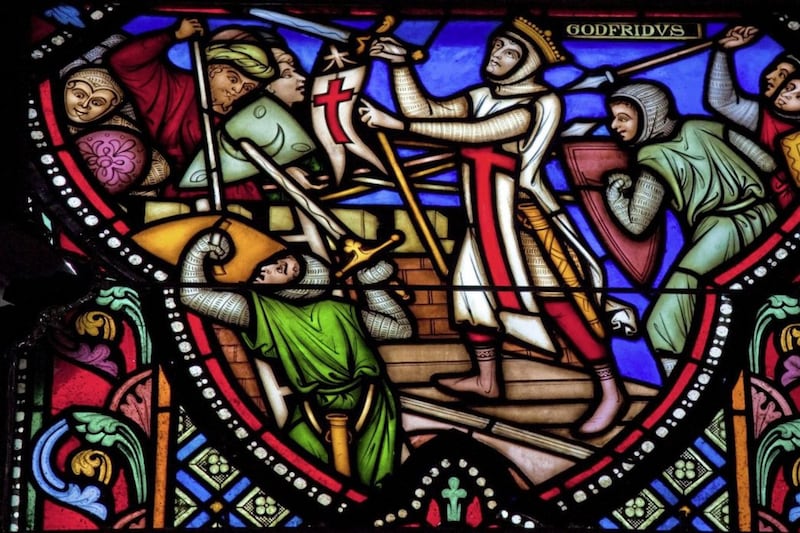THE Gospel of John contains many lengthy speeches by Jesus at the Last Supper, including, at two points in Chapter 14 (verses 1 and 27), the words of consolation: "Let not your hearts be troubled."
While this advice was no doubt welcome in its original context, it might be even more relevant today. Jesus' first followers could understandably have been troubled, when Jesus was giving them pretty clear hints that he was soon to leave them.
They would no doubt have been worried, not just about the fate about to overtake Jesus, but also about the prospect for themselves of being abandoned and lost and confused, with Jesus dead and gone.
It's one thing, however, to be troubled and anxious if you think that some disaster is about to strike you or your friends or your leader, as in the case of Jesus' first disciples. But since the time of Jesus, with the emergence and spread of the Christian Church, a lot of disasters have, sadly, been inflicted by Christians on other people.
The Christian faith has not always been brought initially to other countries, as it was to Ireland, by purely peaceful means, but quite frequently with the Bible in one hand, as it were, and a sword in the other or rather, often enough, with a sword alone at the beginning, and only subsequently with the Bible.
The history of how European nations colonised other parts of the world from the 15th century onwards, bringing their Christian religion with them, is, to put it mildly, a mixed bag. While it includes the story of much self-sacrifice and heroic perseverance on the part of countless missionaries, it also tells the grim tale of how people were at times brutalised in the process of being converted to Christianity.
And some would even argue that in the 20th century the destruction of millions of Jews in the Second World War was partly facilitated by the way that Christian culture had encouraged suspicion and dislike of Jews down through the centuries.
On the island of Ireland itself, as is well known, Christianity has at times been invoked for violent and destructive ends, and even the war in the Balkans at the end of the last century is viewed by some as part of a centuries-old, still unresolved conflict between Latin (Western) Christianity and the Orthodox Christian Churches of the East.
All these different examples of Christianity's historical entanglement with violence can, of course, be argued over. Some may even indignantly contest them, though if anyone were to claim that the Christian conscience is still by and large clear and clean, could that perhaps be because it has rarely enough been used?
It must surely be accepted by any fair-minded observer that there is overwhelming evidence to suggest that Christian hands, after the last 2,000 years, are not entirely lily-white or clean. Is it any wonder, then, if many Christians might today be troubled about their religion's past?
If they - or we - are, worried, then we can perhaps take some comfort from Jesus' words in John's gospel: "Do not let your hearts be troubled."
These words can bring comfort, not in any easy or facile sense of making us forget or deny the sinister side of ourselves or of our Christian past, but in the sense of reminding us of what our faith is mainly concerned with.
Christian faith is a faith in Jesus as the divine saviour of the world, who by the sacrifice of his life on Calvary, brought us to salvation - that is to say, gave us the possibility of getting to heaven.
Christianity fundamentally is not about our own goodness or virtue, but about the goodness and the mercy of God who created and redeemed us and never abandons us, regardless of what horrors we may perpetrate or commit - a simple truth underlined by the 'appearance stories' in the gospels: after the resurrection Jesus didn't try to find new followers, but returned to his former followers, even though they had abandoned him to his fate on Calvary only a short time before.
In short, the truth of the Christian gospel can never be undermined by anything that happens in the world, no matter how terrible, because that truth offers a peace, as Jesus claims, that the world cannot give (or take away), since it is not of this world.
The good news, the gospel, of Jesus Christ is not just that God can forgive sin and overcome evil and death, but that he still loves those who have sinned and continue to sin, and can absorb all the pain and sadness of our history and, against all odds, open heaven for us forever.
For that reason, as Jesus tells his followers, despite all temptation to the contrary, there is no need ultimately to let our hearts be troubled.
Martin Henry, former lecturer in theology at St Patrick's College, Maynooth, is a priest of the diocese of Down and Connor.







